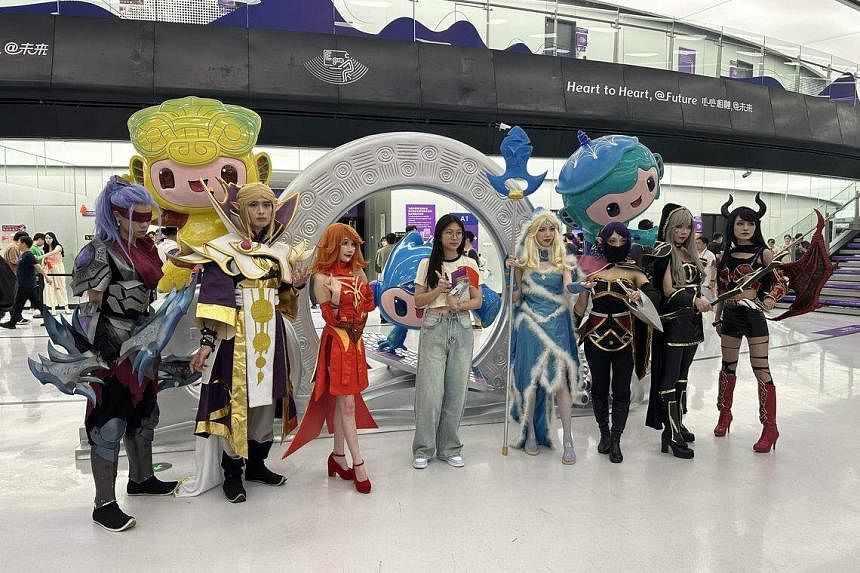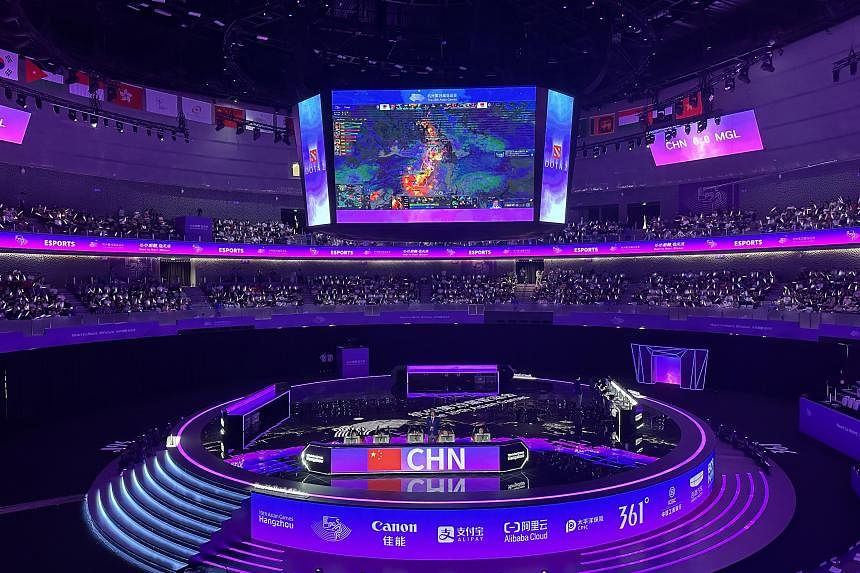HANGZHOU – The “cat and mouse” contest between China and Mongolia whips the 5,000 fans into a frenzy, as game action is played out on a 202 sq m multi-screen jumbotron and courtside commentators rattle on in Mandarin about the teams’ speed, accuracy and teamwork.
A blur of activity in the form of a “killing spree” is taking place in high definition on the four giant screens hung from the ceiling of the China Hangzhou Esports Centre, with audio effects blasting from the surround-sound speakers.
Welcome to the last day of the Asian Games e-sports competition, featuring the Dota 2 final on Monday. Regardless of whether video games actually constitute sport, they surely are a spectacle.
There is an attack on the senses when one arrives in the vicinity of the venue, which looks like a docked spaceship surrounded by high-rise buildings. Streaks of LED lights on its facade add to the futuristic feel.
Upon “boarding”, volunteers warmly greet visitors and hand out China flags and Asian Games mascot hair clips. Mandopop tunes dominate the song list, with light stick-waving fans adding to the concert vibe.
The air-conditioned arena quickly transforms into a red-hot cauldron when the battle begins as the audience roar, applaud and turn the flashing light sticks into multi-coloured clappers, united in their support for the hosts, who came from behind to win 2-1 for their fourth e-sports gold at these Games. Earlier, Malaysia beat Kyrgyzstan 2-0 for bronze.
At the merchandise store, a placard in Chinese reads: “There are no brothers who don’t Dota.”
Dota 2 is a multi-player online video game in which two teams of five players compete to destroy the opponents’ Ancient – a large structure within their base – while defending their own.
Players have distinct roles, as they choose corresponding “heroes” or characters from a selection of more than 120 to execute their tasks.
Several of them, such as Invoker, Crystal Maiden, Templar Assassin and Queen of Pain, appeared at the foyer to pose with fans, who ignored volunteers’ instructions not to mob the fictional characters.

While regular sports fans wear jerseys, e-sports supporters prefer cosplay.
A 21-year-old fan Wang Li, who dressed up as cartoon character Kuromi from the My Melody universe, said: “I play all sorts of mobile and video games every day, but never experienced such an atmosphere before where thousands of people get together to support Team China players.
“Is it sport? To each his own. Shooters also stay still and use mostly their eyes and fingers, and we consider that sport too, no?”
Just like traditional sports, there are role models. Li Wen, 20, gushes about Wang “Ame” Chunyu, who is considered one of China’s most successful Dota 2 players.
With a laugh, she says: “The others look pudgy and unkempt, but Wang Chunyu is handsome and successful.
“Do you know he played for the e-sports wing of the French football club Paris Saint-Germain and has around US$4 million (S$5.5 million) in career earnings?”
Such star appeal is why she is willing to part with good money from working part-time to watch her idol live.
Despite making its Asian Games medal debut, tickets to e-sports competitions are the most expensive. Officially, they cost up to 1,000 yuan (S$191) – compared to access to other sports that can be as cheap as 50 yuan – but black-market tickets have been on sale for more than treble that as demand is oversubscribed.
Not every attendee is e-sports savvy though. A middle-aged man is overheard explaining how one can mine valuable experience and gold by killing lane creeps.
And e-sports is also not only for the young. Last Thursday, the final of Street Fighter V, one of seven titles featured here, was contested between two 44-year-olds with South Korean Kim Gwan-woo beating Taiwanese Hsiang Yu-lin 4-3.
However, inclusivity can still be improved. In what is supposed to be a mixed-gender competition, only eight out of almost 500 gamers here are women, which makes it less consistent with Olympic ideals.
But fans like Huang Weiqin have no doubt that e-sports will make the Olympics soon.
The 29-year-old says: “Millions and even billions are playing and watching around the world. Everyone can see the success of this event here.
“Maybe there needs to be some enforcement to make it compulsory for teams to field female gamers, but it would be quite silly for the Olympics not to capitalise on such reach and popularity.”


